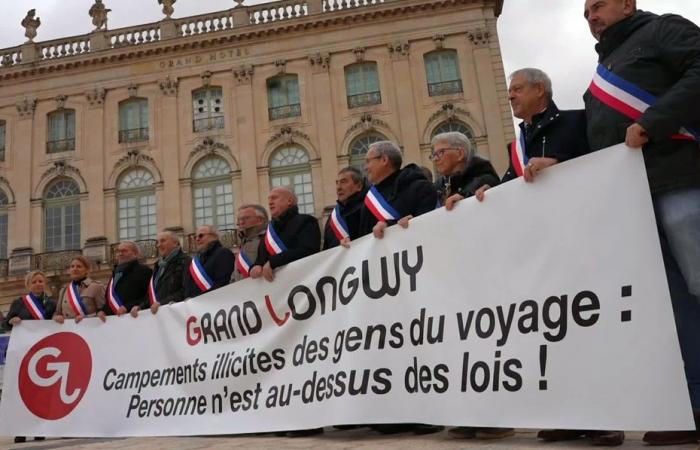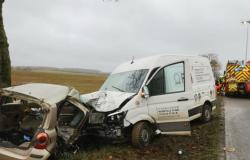Monday, November 18 in Nancy, around twenty mayors from Northern Lorraine, gathered as a collective, placed their tricolor scarves in front of the prefecture of Meurthe-et-Moselle. They are protesting against the illegal installation of Traveler caravans. The summer of 2024 was marked by several incidents.
The essentials of the day: our exclusive selection
Every day, our editorial team reserves the best regional news for you. A selection just for you, to stay in touch with your regions.
France Télévisions uses your email address to send you the newsletter “The essentials of the day: our exclusive selection”. You can unsubscribe at any time via the link at the bottom of this newsletter. Our privacy policy
Around twenty mayors from Pays-Haut (Meurthe-et-Moselle) came to symbolically place their tricolor scarves in front of the prefecture, Monday November 18, 2024, in Nancy. In the morning, a delegation was received by Françoise Souliman, the prefect of Meurthe-et-Moselle.
They are protesting against the illegal settlements of Travelers. “Today, there are 506,000 euros of additional public money to be provided compared to normal management. It is incredible. I simply ask that the rules apply”says Serge De Carli, mayor of Mont-Saint-Martin and president of the Longwy urban community.
We have on average 300 to 400 caravans with exasperation among the populations regarding the lack of resources, the lack of police officers.
Serge De Carli, mayor of Mont-Saint-Martin
For several years, in the summer, gatherings of Traveler caravans have caused tension when camps are set up. “The agglomeration is responsible for the management, creation and maintenance of reception areas. I confirm that we are in compliance with the departmental plan, but the problem is that we have a succession of illegal parking in private and public commercial areas, near schools and also on football stadiums. The waste is very significant. adds Serge De Carli to France 3 Lorraine.
An observation which is not shared by Joseph Charpentier. “At our expense, we bring in dumpsters.” This happens during major events like in Grostenquin in Moselle for example.
Reached by telephone by France 3 Lorraine, and currently in the Paris region, Joseph Charpentier is Pastor of the Vie et Lumière association and organizer of major evangelical events for travelers. He specifies that “Everyone must respect the law. If there were a sufficient number of reception areas and if busy areas were created, we would have fewer problems. We could park.”
Even if this rebellion among Lorraine elected officials is increasing, Joseph Charpentier believes that “if everyone takes their responsibilities, things can work out for one side or the other, for travelers and city mayors alike.”
The geographical position of the Mont-Saint-Martin agglomeration, bordering Belgium and Luxembourg, remains a special case. “Finally, the other question is the presence of Luxembourg. We are at the borders. We have on average 300 to 400 caravans with exasperation among the populations in relation to the lack of resources, the lack of police officers.”
The obligation to welcome Travelers was established 34 years ago in 1990. On its website, the department of Meurthe-et-Moselle specifies that the departmental plan for welcoming and housing Travelers 2019-2024 provides for seven high-traffic areas for a total of 1,080 places and thirteen areas for a total of 308 places. Currently, according to figures from the prefecture in the department, there are six high-traffic areas and eleven permanent reception areas.






